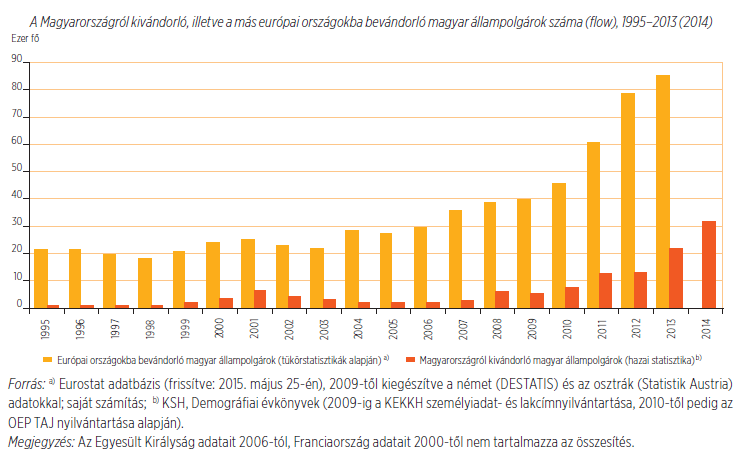Immigration waves between 2006 – present
-reasons for emigrating from the home country
In the trends of the migration there has been a considerable change in recent years. Domestic labour force surveys and mirror statistics of receiving countries started to show an increase in migration to foreign countries from around 2007 on. The number of the Hungarians undertaking work in foreign countries is increasing because:
-the deteriorating economic and labour-market processes before and at the crisis.
-the increasingly bigger demand on the East-Central-European workforce.
-the young persons' increasingly more difficult entry onto the domestic workforce market.
-the high juvenile unemployment.
-the reforms executed in the higher education system in 2008. As a consequence of the decreasing employment rate, an increasing number of Hungarian nationals decided to emigrate abroad. According to statistics, 7.4% of the Hungarians between the age of 18–49 was living abroad in 2013 and their number has significantly increased: 31,000 people moved abroad in 2014, which is 10,000 more than the previous year. The main countries of interest for Hungarians are Germany, where the number of Hungarian nationals is (124,000); United Kingdom (74,500) and Austria (36,000). According to the latest emigration trend, also Switzerland, the Netherlands and Belgium have become popular countries of destination for Hungarian people. To address the increasing pace of emigration, the Hungarian Government launched a programme (“Gyere haza fiatal”) to encourage the return of young Hungarians living in the UK. The programme targets the Hungarians with a higher education degree who have emigrated from Hungary. Through the programme, the young professionals can receive several types of assistance. The programme offers several job opportunities, housing assistance and mobility grants to facilitate the travel of those interested in returning for job interviews and mentoring.

-reasons for immigration into Hungary
Hungary is a member of the EU and of the Schengen visa zone. The cost of living in Hungary is significantly lower compared to other European countries (e.g. real estate, utilities, public transportation, private clinics and schools are all cheaper). Just form a company in Hungary, and as a business owner you can immigrate to Hungary with your family. Starting the company is easy with just EUR 10,000 capital. We assist with employee hiring, taxes, accountancy and manufacturing, renting office, virtual office in Budapest, Hungary. Last year Hungary was a key entry point into the EU's border-free Schengen zone. The 28-nation bloc struggles to cope with an influx of about 1.4 million people since the start of 2015, many fleeing conflicts like the war in Syria.
Traditionally speaking, Hungary is a transit, source, and destination country of both regular and irregular migration. Its geographical location, European Union (EU) membership and relative prosperity, coalesced, act as a pull factor for migrants from neighbouring countries, including ethnic Hungarians. As an EU Member State, a section of Hungary’s borders form the external borders of the European Union.
Due to its geographical location, Hungary is one of the main transit countries of irregular migration on land towards other Member States of the European Union. Eastern and south-eastern migration routes cross the territory of the country, with the so-called Western Balkan route (via Turkey, Greece, Serbia or Croatia to then via Hungary to other EU Member States) being the most active. Prior to the construction of the fence along the two southern borders, Hungary-Serbia and Hungary-Croatia, the country was one of the main entry points into the EU for migrants seeking to move on to other Member States. For Hungary, combating irregular migration is currently the utmost priority. There were 411,515 irregular border crossings completed or attended during the year 2015 and over 8,000 during the first quarter of 2016, which is a dramatic increase compared to the previous years: 50,065 irregular border crossings in 2014 and 26,061 in 2013, while in 2012 this number did not even reach 10,000.
sources:
http://www.hungary-immigration.com/
http://iom.hu/migration-issues-hungary
http://www.portfolio.hu/gazdasag/kivandorlo_orszagga_valik_magyarorszag.217534.html
